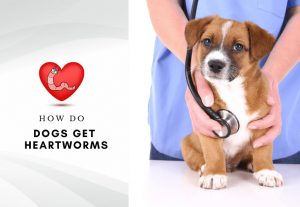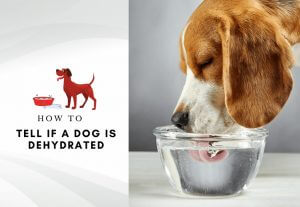Heartworms are recognized as a global threat to dog health. Dogs are the primary host for heartworms, which means that juvenile heartworms can grow, mature, and multiply in your dog’s body.
Heartworm infection is a severe illness that leads to heart failure, severe lung disease, damage to dog organs, and even death.
Dogs get heartworm infestation from mosquitos. When an infected mosquito bites a dog, it spreads the infectious larvae from one dog to another through the bite. They survive in the dog’s heart, copulate, and produce offspring known as microfilariae that exist in the dog’s blood vessels.
What Are Heartworms?
Heartworms are parasitic worms commonly seen in dogs, although some cats can become infected, in very rare cases humans can become infected as well. Heartworms are caused by a parasitic worm known as Dirofilaria immitis. It is a parasite with a complex life cycle and needs a mosquito and a dog to complete it.
They live inside a dog’s heart, lungs, and arteries, and can cause serious damage to those vital organs. Heartworms can be a real problem for dogs and their owners.
So if you want to know how your dog gets heartworms to help you reduce their exposure and keep your dog healthy, read on.
The next paragraphs have everything you need to know about how dogs get heartworm.
How Do Dogs Get Heartworms?

According to the Heartworm Association, in the United States, dogs have the highest rate of infection with this parasite. This occurs within the Gulf Coast, the Atlantic coast, and the Mississippi River. Though, there are cases in all the states and mostly in areas where there are large populations of mosquitoes.
A lot of owners question how their furry pals get heartworms.
It is important to note that the only means a dog can get heartworms is by the bite of an infected mosquito. This is not a contagious disease, which means your dog cannot get the disease by being close to an infected dog.
Heartworm can only be transmitted when an infected mosquito bites an uninfected dog. The heartworm larvae in the dog’s coat can then find their way into the dog’s skin and begin to grow.
Mosquitoes are infected with the parasite after biting an infected dog. The steady cycle between dogs and mosquitoes helps transmit the parasite from one dog to another.
The danger with heartworm is that as long as there is one positive dog in the community, all dogs are likely to be at risk. But if you know the symptoms of heartworms in dogs that will help you take quick steps that will save your dog’s life.
Signs of Heartworms in Dogs

The symptoms of heartworm in dogs are different from one dog to another. The best thing to do if you suspect infection is to take your dog to the vet for an appropriate diagnosis.
Note that most dogs with heartworm tend to show visible symptoms of the disease when it is too late to be treated. Early detection is very important when it comes to the quick treatment of heartworm in dogs.
Heartworm infection is a silent killer in dogs; it can take some time for a dog to show signs. In the early stages of the disease, most dogs show little or no symptoms. The more the disease develops, the more likely the noticeable symptoms will develop.
The following are among the early symptoms of dog heartworm. If your notice any of these symptoms, don’t delay taking your dog to the vet.
1. Persistent Cough
One of the early symptoms of heartworm in dogs is constant cough without any clear reason. This cough differs from the regular cough or kennel cough, which is a strong and sporadic cough.
The cough associated with heartworms is dry and persistent. In the early stages, this cough can be triggered by even small amounts of exercise.
2. Weight Loss and Loss of Appetite
As the infection advance in stages. Your dog will find it difficult to complete regular physical tasks, such as eating. When the disease begins to spread, it becomes difficult for dogs to gather enough strength for even the simplest tasks.
Regular actions like walking and eating can become stressful; this can lead to rapid weight loss. If you detect a lack of appetite and weight loss in your dog. You should contact your vet immediately to rule out heartworm infection and any other serious diseases.
3. Difficulty Breathing
Besides coughing, your dog may suffer breathing problems that resemble an asthma attack in dogs. Also, fluid can build around the blood vessels in the lungs, which makes it difficult for the lungs to deliver oxygen to the blood.
4. Swollen Chest
A bulged, distended, or swollen chest is often a symptom of heartworm infection in adults. These symptoms are generally caused by weight loss, loss of appetite, and fluid build-up.
5. Collapsing
Once a large number of heartworms enter your dog’s heart. It can cause blockage of blood flow, also known as vena cava syndrome. Collapsing is often associated with shock and the destruction of red blood cells. At this stage, the disease has progressed to a level where death can happen within days.
How to Prevent Heartworms in Dogs?

Heartworm can be very dangerous; it has taken the lives of many beloved dogs each year. And as a good owner, it is your responsibility to give your furry pal good health and quality life for as long as possible.
To achieve this, heartworm prevention should be at the top of your list. And if you want to know how you can achieve this, the following are the best ways to prevent heartworm in dogs.
1. Keep Your Home Free of Mosquitoes
It may not be your top priority, but the mosquito is important in the life cycle of heartworm. A mosquito can be a threat in and around your own home.
It can breed in small amounts of stagnant water found in empty containers around the house, rain gutters, flowerpots, and low-lying areas in the backyard.
You can protect your dog from mosquitoes with K9 Advantix II Flea and Tick Prevention or Adams Flea & Tick Collar for Dogs.
- 6 monthly applications of K9 Advantix II flea and tick prevention for extra-large dogs weighing 55 pounds or more
- K9 Advantix II flea and tick prevention for dogs works through contact, so fleas, ticks and mosquitoes do not have to bite your dog to die
- K9 Advantix II flea and tick control for dogs is an easy to apply topical formula
- Starts working to kill fleas within 12 hours and keeps working for 30 days
- Suitable for effective year-round dog flea and tick treatment for extra-large dogs
Prices pulled from the Amazon Product Advertising API on:
Product prices and availability are accurate as of the date/time indicated and are subject to change. Any price and availability information displayed on [relevant Amazon Site(s), as applicable] at the time of purchase will apply to the purchase of this product.
- PREVENTS INFESTATIONS: Kills adult fleas before they lay eggs and adult ticks for up to 6 months
- REPELS MOSQUITOES*: Repels mosquitoes* for up to 6 months (*Excluding California)
- WATER-RESISTANT: Wetting will not impair the collars effectiveness or the dogs protection from fleas, ticks, and mosquitoes* (*Excluding California)
- FOR BEST RESULTS: Multiple steps or products can be necessary to help fight fleas and ticks on your pet – check out our website for more helpful tips and tricks!
- ONE-SIZE-FITS-ALL: Adjustable; one-size-fits-all; just cut to size
- 12-MONTH PROTECTION: A full years protection with two collars in each tin
- PET, HOME & YARD: 5% of fleas live on your pet while the remaining 95% live in your home or yard. Adams provides a multi-step product solution to fight pests on every front – Complete your system with our Pet, Home, and Yard products.
Prices pulled from the Amazon Product Advertising API on:
Product prices and availability are accurate as of the date/time indicated and are subject to change. Any price and availability information displayed on [relevant Amazon Site(s), as applicable] at the time of purchase will apply to the purchase of this product.
2. Get Your Dog Regular Checkups
It is important to take your dog to the vet to undergo a complete physical examination at least once a year. Your vet will be able to check for symptoms and signs of heartworms and other parasites that you may have missed.
3. Use Preventative Heartworm Medicine
Heartworm disease in dogs can be prevented through regular and proper use of preventive medications prescribed by your veterinarian.
There are different types of heartworm preventive medicine such as Heartgard Plus Soft Chew for Dogs.
Your vet can approve a monthly topical medication that comes in a tube or can recommend an injectable product, which lasts for six months at a time. Or an oral tablet to be taken monthly.
How to Treat Heartworms in Dogs

Heartworm in dogs can be treated with chemical therapy if detected early enough. The treatment is usually done over a period of time. Heartworms don’t die in a single action because the dead worms will end up in the lung and kill the dog.
Also, the chemicals used to kill heartworms can be fatal to dogs.
This is why any heartworm treatment for dogs that involves the use of chemicals should only be handled by a veterinarian.
Surgery is also another treatment option for dogs suffering from heartworm. But surgery is only performed if requested by the veterinarian and if it is the only option for treating your dog heartworm infections.
FAQ About Heartworms in Dogs

Can Dogs Get Heartworm From Another Dog?
The answer is no, heartworm disease is not contagious. Your dog cannot get the disease from being around an infected dog. The disease is transmitted only through the bite of a mosquito. Heartworms are only transmitted when a mosquito bites an infected dog and then bites an uninfected dog.
What Are The First Signs of Heartworms in Dogs?
Dogs may not show any symptoms in the early stage of heartworm infection, the first noticeable symptom of heartworms in dogs is cough. You may hear your dog cough from time to time, particularly after exercise. If left untreated, it progresses to rapid breathing and weight loss.
Is There a Treatment for Heartworm Disease in Dogs?
Melarsomine is the only drug approved by the U.S. Food and Drug Administration (FDA) for the treatment of heartworm infection in dogs. It kills mature heartworms in the heart and contiguous vessels.
This medication is given in a sequence of injections. The vet will decide the exact injection schedule based on your dog’s condition.
Also, you can treat your dogs with an antibiotic such as doxycycline, to fight a possible infection with the bacteria like Wolbachia that live in heartworm. Always consult your veterinarian before administering any medication to your dog.
At What Age Do Dogs Get Heartworms?
The American Heartworm Society (AHS), recommends starting heartworm prevention for puppies at 8 weeks of age and maintaining it throughout the year. If your dog is more than six months, it is important to test your dog for heartworm before giving him preventive medication.
Conclusion

Heartworm in dogs is a prevalent and deadly disease, and if not treated can lead to death. As a dog owner, knowing how dogs get heartworms is vital to your dog’s survival and well-being.
Now that you know about heartworms and the risks they pose to your dog, if you suspect your dog has heartworm disease, don’t wait, and contact your vet immediately.
If the disease is confirmed, your dog will need to go through treatment to keep him healthy, active, and free from heartworms.
That being said, there is nothing left but to thank you for your attention up to this point.
I hope I have been helpful, and I wish you many moments of joy and satisfaction in the company of your beloved dog.
If you enjoyed this article don’t forget to share it with your friends.
Until next time!
A big hug.
Read also:





